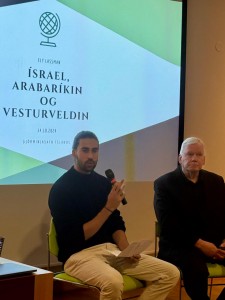 Ely Lassman, an economist from Israel working in the United Kingdom, and the founder and chairman of Prometheus on Campus, gave a talk in Reykjavik on 14 October 2024 on ‘Israel, the Arab Countries, and the West’. The event had to be by invitation only because of the aggression shown recently at many events in Iceland by militant supporters of Hamas and Hesbollah, the two terrorist organisations trying to destroy Israel. The talk was at the National Museum at lunchtime, and was chaired by Hannes H. Gissurarson, Professor Emeritus at the University of Iceland. Lassman served in the IDF, the Israeli Defence Force, and shared many insights with the audience about life as an Israeli citizen and soldier. He recalled that in 1947 the United Nations proposed the division of the British Mandate of Palestine between a Jewish and an Arab state. The Jews accepted the proposal, but the Arabs rejected it and started fighting against the Jews, aided by several Arab states that attacked Israel upon her declaration of independence in May 1948. While Israel managed to repel the attack, two areas mainly populated by Arabs, Gaza and the West Bank, were occupied by Egypt and Jordan, respectively. Then, after her victory in the 1967 Six-Day War, Israel occupied those two areas.
Ely Lassman, an economist from Israel working in the United Kingdom, and the founder and chairman of Prometheus on Campus, gave a talk in Reykjavik on 14 October 2024 on ‘Israel, the Arab Countries, and the West’. The event had to be by invitation only because of the aggression shown recently at many events in Iceland by militant supporters of Hamas and Hesbollah, the two terrorist organisations trying to destroy Israel. The talk was at the National Museum at lunchtime, and was chaired by Hannes H. Gissurarson, Professor Emeritus at the University of Iceland. Lassman served in the IDF, the Israeli Defence Force, and shared many insights with the audience about life as an Israeli citizen and soldier. He recalled that in 1947 the United Nations proposed the division of the British Mandate of Palestine between a Jewish and an Arab state. The Jews accepted the proposal, but the Arabs rejected it and started fighting against the Jews, aided by several Arab states that attacked Israel upon her declaration of independence in May 1948. While Israel managed to repel the attack, two areas mainly populated by Arabs, Gaza and the West Bank, were occupied by Egypt and Jordan, respectively. Then, after her victory in the 1967 Six-Day War, Israel occupied those two areas.
In 2005, the IDF left Gaza in an attempt to make peace with the Palestinian Arabs, and the Israelis who lived there also had to leave. But Hamas seized power and systematically destroyed all the infrastructure left behind in Gaza, because it was Jewish-made. Hamas openly declared its aim as being to kill all Jews in Israel. Therefore, although the invasion of Israel by Hamas on 7 October 2023 was a serious security lapse, it was not surprising in itself, nor the fact that it was conducted in a barbaric way, as documented by the Hamas combatants themselves. Both Hamas and Hesbollah relied on a certain interpretation of Islam. They were thus motivated by ideas. What these terrorists and Western socialists had in common was hostility towards Western civilisation, the idea of diversity, prosperity, choice, and individual flourishing. Israel was the only Western country in the Middle East, Lassman said.
The meeting was well attended, and a lively discussion followed Lassman’s talk. He was asked about public opinion in Israel on the war. He replied that the Israelis were united in their will to defend themselves and to respond to the savage attack on 7 October 2023. But people saw different objectives in the war. The right wanted completely to destroy Hamas and Hezbollah, whereas the priority of the left was to liberate the hostages Hamas was still holding. Lassman was also asked why not only the extreme but also the moderate left in the West was siding with the Arabs in Palestine. He replied that leftists tended always to side with the weak in any conflict. It seemed not to matter to them whether the cause of the weak was just or not. Israel had been rather weak for the first decades of her existence and her survival had by no means been certain. Then many leftists had been in sympathy with her. But when Israel became a strong power, defeating the Arab countries in one war after another, leftists had turned against her—not because her cause had become unjust, but because now she was considered to be the more powerful combatant and the Arabs in her territory to be the weaker one.



